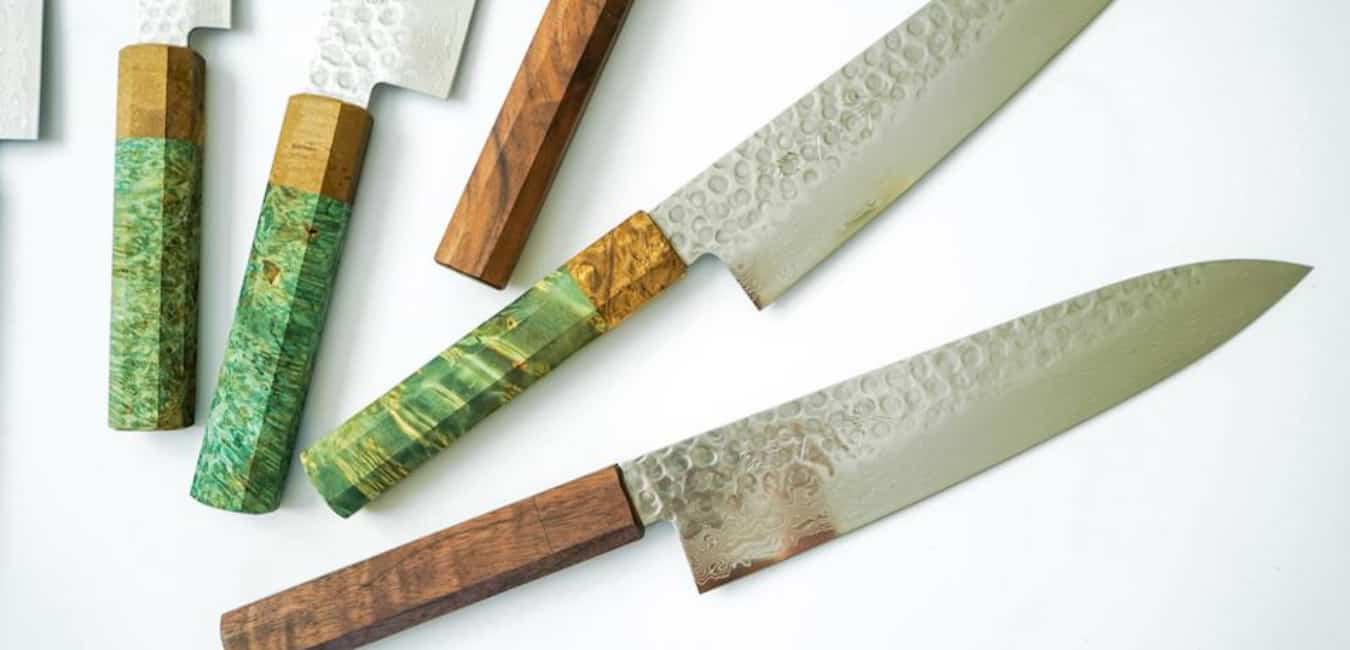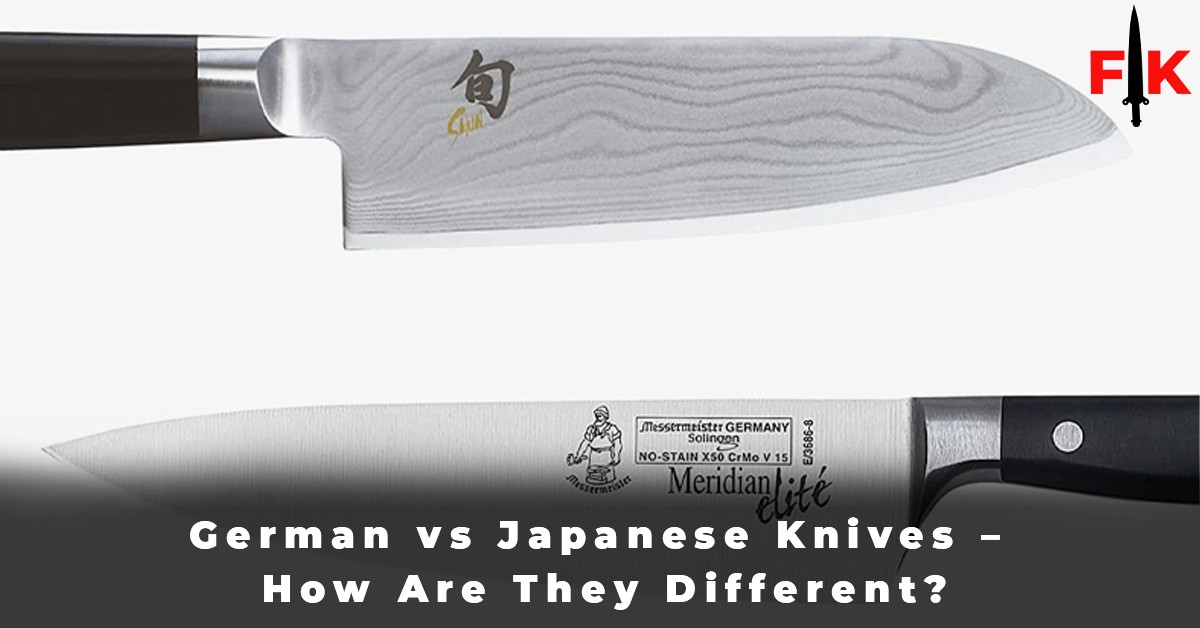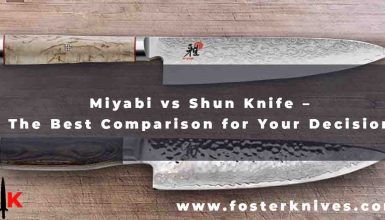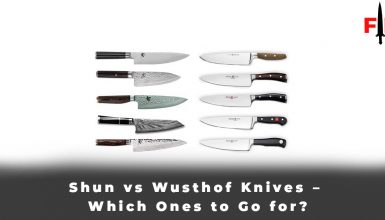People often ask, “German knives or Japanese; which ones are better?” Well, you can’t decide on one of these until and unless you know the facts about them. German and Japanese knives are very much alike but how they differ, actually depends on your needs. In order to prepare food to perfection, a good knife is essential, so it’s important that you choose the right one for your needs.
What’s the Difference Between German and Japanese Kitchen Knives?
A German knife is a workhorse, a workhorse that’s always ready. And for delicate work such as slicing, Japanese knives are best suited.
| Product | Key Features |
|---|---|
| German Knives |
|
| Japanese knives |
|
In this very article, we are going to help you understand the major differences between German and Japanese knives. Let’s see what differences do they have.
What Defines a German Knife?
German knives are known for the perfect built combo of blade angle, thickness, and sharpness.

Blade Angle
The blade angle of German knives is generally wider than any other type; you will usually find a 17.5-degree angle in most of these kitchen knife sets. Or in some of their types, the blade angle is between 20 – 22 degrees.
Knives have varying levels of sharpness depending on the angle of the blade. Smaller blade angles make sharper knives and sharper knives allow clean cutting without damaging the food.
Design
The majority of German knives have full-tangs and bolsters. The full-tang knives are equipped with a blade that extends all the way to the handle. In comparison to other knives, the ones with bolster provide additional strength when chopping tougher vegetables.
Steel
The blades of German knives are made of steel just as those of Japanese knives. The German knives contain comparatively less amount of carbon in their steel blades. Hence they are softer and far more durable. However, the edge won’t last as long as that of harder steel.
Hardness
Steel hardness is measured by Rockwell’s standard scale, and according to that, German knives come in around 57 on the scale. The sharpest edge retention comes from Rockwell hardness above 58, but it requires greater care when dropped or misused, as they can chip and break.
Thickness
German knives have thicker, wider, and bolstered blades. The bolster is actually what decides the thickness of a knife. And in the case of German knives, the steel is wider at the bolster, which adds weight and balance to the knife and allows it to transition smoothly to the blade.
Weight
Weight differs according to the blade of each knife. But overall, German knives are heavy in weight.
What Defines a Japanese Knife?
Japanese knives are known for their lightweight and the perfect cuts they produce.

Blade Angle
Japanese knives have blades less wide compared to German knives. So, on average, Japanese knives have their blade angles between 12 and 15 degrees.
In general, cutting with German knives requires a higher level of precision than cutting with their Japanese counterparts Knives that have smaller angles are sharper.
Design
Unlike western knives, Japanese knives are often devoid of bolsters and vary in length from maker to maker. Thus, Japanese knives are way lighter and more useful. Furthermore, Japanese knives have a straighter edge, which makes them better suited for chopping and slicing.
Steel
The steel blades of Japanese knives contain comparatively more carbon than the German blades. That is one of the reasons that Japanese knives are long durable and hold a super sharp edge. Moreover, their blades are thin and delicate that produce extremely clean cuts.
Hardness
A Japanese blade is typically forged with steel having a Rockwell hardness between 60 and 63. The Hard VG-MAX steel used in Japanese knives is being surrounded by 68 layers of Damascus steel. Unlike German steel blades, Japanese steel blades contain more carbon in their blades, which makes them harder as well.
Thickness
The Japanese blade is thinner than the German blade. These knives are also sharper, making them ideal for cutting and chopping vegetables, fruits, and fish.
Japanese knives are usually bolster-free, so the thickness remains consistent throughout.
Weight
Japanese knives are pretty much lighter in weight as they have thinner and delicate blades.
German vs Japanese Knives – Comparison
| German Knives | Japanese Knives | |
|---|---|---|
| Origin | Germany | Japan |
| Blade Angle | Usually 17.5 degrees Maybe 20 to 22 degrees in some cases | Between 12 to 15 degrees |
| Shape | Curved Geometry | Straighter edge |
| Steel | Comparatively softer | Harder |
| Hardness | 56 to 58 on the Rockwell scale | 60 to 61 on the Rockwell scale |
| Weight | Heavy in weight | Light in weight |
|
Thickness
|
Thicker. Often have bolsters | Thinner. Bolster free. |
Conclusion
In a nutshell, the use of a good quality Japanese knife would be ideal for any delicate task like cutting sashimi or tomato slices. The precision and finer cuts will come effortlessly and gracefully to you.
While the thick blades of German knives are strong and most suitable for cutting through tough foods like pumpkins, watermelons, thick cuts of meat, etc.
The rest remains on you to decide which knives would suit you best according to your needs.



